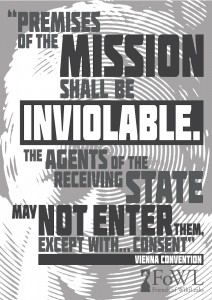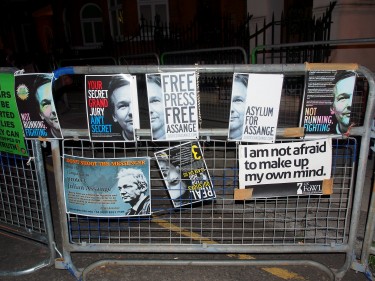This morning, Thursday 16 August, 2012, in a press conference streamed from the website of the Ecuadorian Ministry of Foreign Affairs, Minister Ricardo Patiño (@RicardoPatinoEC) declared that the country would grant asylum to the Founder and Editor of WikiLeaks, Julian Assange.

Picture by Sommerset Bean used with permission.
Patiño said that Assange's fears of being persecuted in the United States were justified, therefore he satisfied all legal requirements for political asylum under international human rights and humanitarian law. Still, there is no guarantee that Assange will not be extradited to the United States after a long consultation process. Patiño explained the legal reasons in detail in a number of points.
Assange was facing imminent extradition to Sweden for interrogation about sexual allegations he has not been charged for, where he would have been detained upon arrival in solitary with no right to bail, according to Fair Trials International. At the last minute he decided to exercise his right of seeking asylum. He walked into the Embassy of Ecuador and has stayed under diplomatic protection while the country's President Rafael Correa reviewed his case.
The Ecuadorean government based its decision on past and current attacks on WikiLeaks, its founder and even volunteers, which have been unprecedented both in scale and severity. At least seven civilians are being investigated by the FBI, in a Secret Grand Jury that might or might not be taking place in Virginia, US, as it is secret and no official can talk about it.
Indeed, WikiLeaks and individuals who have worked with the project have faced various threats and challenges from both private and public entities. US government officials issued a subpoena to Twittter, requesting that the company disclose personal information and past twwets of activists and computer experts such as Jacob Appelbaum (@ioerror) from Tor Project, who once collaborated with Wikileaks. There have been institutional prohibitions on viewing WikiLeaks documents in public libraries, such as the Library of US Congress, and calls for execution and espionage trial from public officers. Another pressure point on Assange and Wikileaks is the extrajudicial banking blockade.
US army officer Bradley Manning, who is suspected of leaking the classified materials to WikiLeaks, has been arrested and placed in solitary confinement, an extreme measure that even UN Special Rapporteur Juan Mendez called torture. Over 200 law professors have signed a letter denounced Manning's treatment.

Placards and posters attached to crowd barriers outside the Ecuadorian embassy voicing support for Wikileaks founder Julian Assange. Image by Pete Riches, copyright Demotix (16/08/12).
The Embassy controversy
After rumors that asylum had been granted began circulating and President Correa announced that he would study the case on Wednesday 15 August with experts, United Kingdom authorities responded saying that they would respect the Swedish extradition order and send the police to arrest Assange, even if he was protected by Correa's decision.
Officials said they could claim the authority to walk onto Embassy premises, news that sparked anger from many arguing that it would violate the Vienna Convention on Diplomatic and Consular Relations.
Following these threats, Ecuadorean authorities called for a press conference and denounced the hostile attitude of the British. After that, police presence outside the Embassy increased.
Citizen reporters gathered outside the Ecuadorean Embassy in London and reported on the situation, tweeting and livestreaming video and commentary from the location. @alburyj – a user of Bambuser – reported from the site for several hours. Supporters displayed hand-made posters demanding respect for the Vienna Convention. On Twitter, #OpProtectAssange was launched.
The Center for Constitutional Rights, based in the US, said via Twitter account @theCCR:
#UN GA unanimously declared granting asylum cant be regarded as an unfriendly act by other countries. UK gov threat re #Assange is shameful
A UK Barrister and expert explained how the British threats and action might be illegal.
Twitter user @ProgGraham wondered what would happen if it was the Government of Ecuador were the one in the UK's position:
If #Ecuador threatened to storm the #UK embassy, they would be called dictators and oppressors, would they not? #Assange
There were reports of supporters being arrested by the Metropolitan police on the scene. Taxis called to the Embassy by activists to drive Assange to Heathrow Airport featured stickers in support of Assange, as supporters awaited and celebrated the decision, though Assange ultimately was unable to exit the Embassy.
Assange will likely remain at the Embassy, where he reportedly sleeps on an air mattress on an office floor, until UK and Ecuadorean officials can resolve the conflict over what status he will have while in transit within Britain and while traveling to Ecuador.
Unanswered questions
Many unanswered questions remain following the announcement: whether the UK will send police to the Embassy, bringing a possible end of diplomatic relations between the two countries; the reactions of the Organization of American States and the Union of South American States, after they meet to discuss the threats against a member State (Ecuador); the position of the US – a country which recognizes and grants asylum to journalists and whistleblowers in similar circumstances; and the reactions of Sweden – a country that is often a hub for those who seek refuge in other territories.
For more information, Humunculus Flannel is live tweeting on this issue.




6 comments